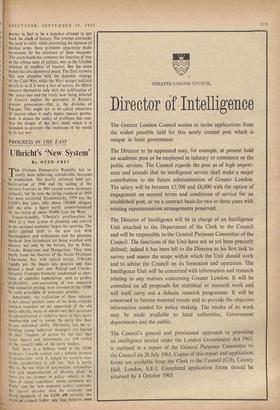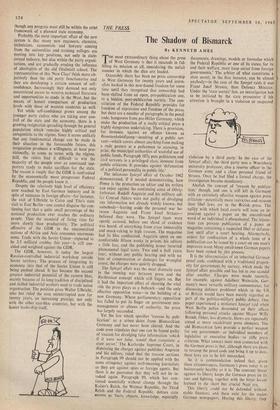PROGRESS IN THE EAST Ulbricht's 'New System'
By OTTO FREI
rrHE German Democratic Republic has re-
cently been achieving considerable increases in production. The hastily enforced land col- lectivisation of 1960 and the sealing of the western frontiers in 1961 caused severe economic setbacks, but by now the living standard of 1959 has been recovered. Economically, 1959 was the CiDR's best year; only about 150,000 refugees left the area. a figure partly counterbalanced by the return of about 50,000 from the West.
Unquestionably, Ulbricht's proclamation in 1963 of a 'new system of planning and control in the national economy' began the upswing. The Party applied itself to the new task with thoroughness and enthusiasm and the planning methods then introduced are being watched with interest, not only by the Soviets, but by Poles, Czechs, Bulgarians and Hungarians. They stem Partly from the theories of the Soviet Professor. Libermann, but, with typical energy, Ulbricht rapidly put the theory into practice and thus ,gained a head start over Poland and Czecho- slovakia. Concepts formerly condemned as abor- tions of capitalist exploitation, such as profits, Profitability, cost-accounting of raw materials and industrial pricing, were elevated in the GDR to valid principles of economic practice.
Admittedly, the realisation of these reforms is not always perfect; some of the drive towards renewal founders on the opposition of the old Party officials, many of whom owe their positions in administration or industry more to their party membership and to toeing the party line than to any individual ability. Obviously, too, the re- forming young industrial managers are limited in their freedom of action by the fact that target figures and investments are still settled at the council table of the Party leaders.
Still, there is a definite trend in the GDR economy towards realism and a definite increase in production—even if, judged by western stan- dards, productivity is still low. This is partly due to the low level of automation, rationalisa- tion and modernisation of obsolete plant. If there are no changes in policy- which, in the light of recent experience, seems extremely un- likely and the 'new economic policy' continues for ,everal decades, then, the economy and living Mand,irds of the GDR WM certainly im- Pi ove ;at a much higher rate than hitherto, even
though any progress must still be within the strict framework of a planned state economy.
Probably the most important effect of the new system is that many new engineers, chemists, technicians, economists and lawyers- coming from the universities and training colleges are moving into key positions, not only in state- owned industry, but also within the party organi- sations, and are gradually eroding the influence of ideologists of the old (Stalinist) school. The representatives of this 'New Class' think more ob- jectively than the old party functionaries and they are developing a certain amount of self- confidence. Increasingly they demand not only unrestricted access to western technical literature and opportunities to study in the West, but the means of honest comparison of production levels with those of western countries as well.
Yet while self-confidence grows among the younger party cadres who are taking over con- trol of the state and the economy, there is a growing resignation spreading through the general population which remains highly critical and antagonistic to the regime. Since it seems anlikely that any fundamental change can be made in their situation in the foreseeable future, this resignation produces a willingness, at least pro- visionally, to come to terms with the regime. Still, the rulers find it difficult to win the majority of the people over as convinced sup- porters ready to make sacrifices for the state. The reason is simply that the GDR is confronted by the economically more prosperous Federal Republic, and the people know it.
Despite the relatively high level of efficiency now reached by East German industry and in spite of successes in foreign affairs—for instance, the visit of Ulbricht to Cairo and Tito's state visit to East Berlin—one cannot disguise the con- tinuing fact that a quite small percentage of the national production ever reaches the ordinary people. Thus the standard of living rises far more slowly than productivity. The political offensive of the GDR in the uncommitted nations of Africa and Asia consumes enormous sums. Trade with the Soviet Union—expected to be 2.5 milliard roubles this year—is still one- sided and weighted against the GDR.
The GDR, however, is today the largest Russian-controlled industrial workshop outside Soviet territory. The process of integrating its economy into that of the Soviet Union is still being pushed ahead. It has become the second greatest industrial potential of the eastern bloc, mainly because of its long tradition of disciplined and skilled industrial workers used to trade union organisation. The position gives Walter Ulbricht, who has ruled the area uninterrupted now for twenty years, an increasing prestige, not only with the other east-bloc countries, but with the Soviet leadership itself.



































 Previous page
Previous page